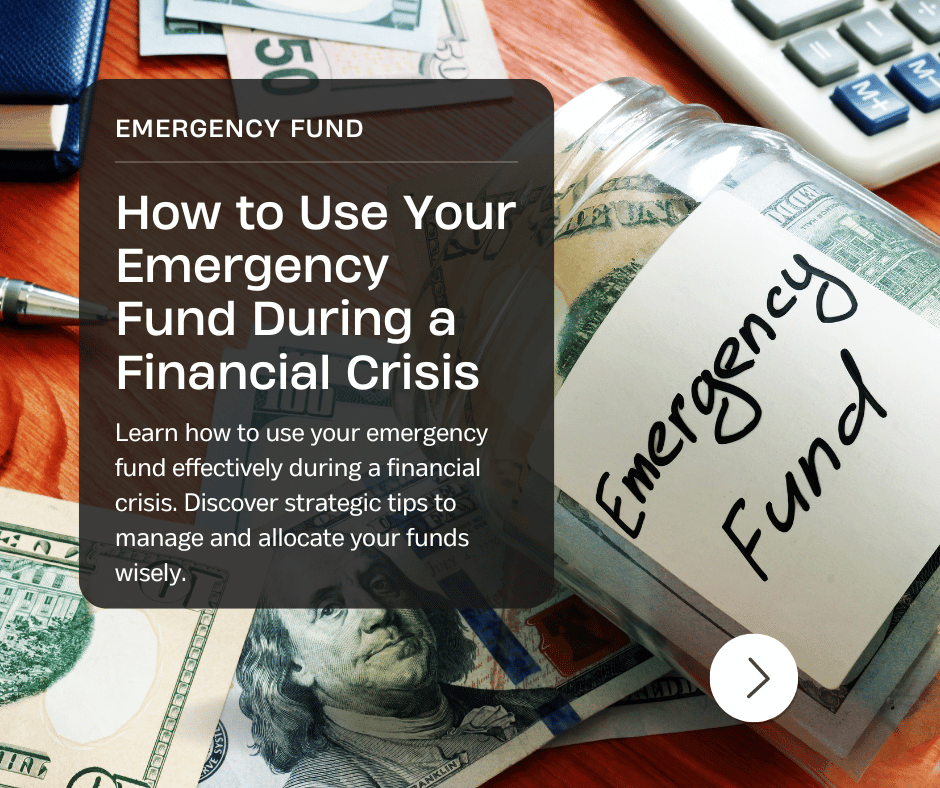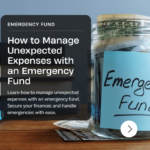Introduction
In times of financial uncertainty, having an emergency fund can be a lifeline. An emergency fund provides a buffer that allows you to navigate through crises without jeopardizing your financial stability. But understanding how to use your emergency fund effectively during a financial crisis is crucial. This article will guide you through the strategic use of your emergency fund, ensuring you maximize its potential to safeguard your financial health.
Understanding the Purpose of an Emergency Fund
An emergency fund is specifically designed to cover unforeseen expenses that arise from unexpected events. These can include medical emergencies, sudden unemployment, urgent home repairs, or major car breakdowns. The primary goal is to avoid the need for high-interest debt and to maintain your financial stability during turbulent times.
Assessing Your Financial Situation
Before you tap into your emergency fund, it’s essential to assess your overall financial situation. Evaluate your current income, ongoing expenses, and any other available resources. Understanding the full scope of your financial landscape will help you determine how much of your emergency fund you need to use and for how long it needs to last.
Prioritizing Expenses
During a financial crisis, not all expenses are created equal. Prioritize your spending by focusing on essential needs such as housing, utilities, food, and healthcare. Cut down on non-essential expenditures to stretch your emergency fund further. This prioritization will help ensure that your fund covers the most critical areas of your life.
Creating a Budget
Crafting a new budget that reflects your current financial reality is a crucial step. Include your reduced income, essential expenses, and any temporary financial assistance you might receive. This revised budget will serve as a roadmap, helping you manage your emergency fund efficiently.
Reducing Non-Essential Spending
In a financial crisis, every penny counts. Review your budget and identify areas where you can cut back. This might include canceling subscriptions, reducing dining out, or postponing non-essential purchases. By minimizing unnecessary spending, you can conserve your emergency fund for longer periods.
Exploring Additional Income Sources
While using your emergency fund, it’s beneficial to seek additional income sources. This could be through freelance work, part-time jobs, or selling unused items. Any extra income can supplement your emergency fund, reducing the strain on your savings.
Negotiating Bills and Payments
Many service providers offer assistance programs during financial crises. Contact your creditors, utility companies, and other service providers to negotiate lower payments or deferments. This can alleviate some financial pressure and help you preserve your emergency fund.
Avoiding High-Interest Debt
One of the primary purposes of an emergency fund is to avoid high-interest debt. However, if you find yourself in a situation where borrowing is necessary, opt for low-interest options and consider the repayment terms carefully to avoid exacerbating your financial troubles.
Rebuilding Your Emergency Fund
Once the crisis subsides, focus on replenishing your emergency fund. Set up a savings plan that automatically transfers a portion of your income into the fund. Rebuilding your emergency fund ensures that you’re prepared for any future financial uncertainties.
Investing in Financial Education
Enhancing your financial literacy can empower you to make better decisions during a crisis. Learn about budgeting, investing, and debt management. The more knowledgeable you are, the better equipped you’ll be to handle future financial challenges.
FAQs
How much should I have in my emergency fund? A good rule of thumb is to have three to six months’ worth of living expenses in your emergency fund. This amount can vary depending on your personal circumstances and risk tolerance.
When should I use my emergency fund? Use your emergency fund during genuine financial emergencies such as sudden job loss, major medical expenses, or critical home repairs. It’s important to preserve the fund for truly unforeseen situations.
What if my emergency fund runs out? If your emergency fund depletes, look for other financial assistance options such as unemployment benefits, community support programs, or temporary loans with favorable terms. Additionally, continue to cut back on non-essential spending and seek alternative income sources.
Can I invest my emergency fund? It’s generally not advisable to invest your emergency fund in volatile assets. The primary purpose of an emergency fund is liquidity and safety, ensuring that funds are readily available when needed.
How can I build an emergency fund quickly? Start by setting small, achievable savings goals and gradually increase the amount. Automate your savings to ensure consistency, and cut back on discretionary spending to allocate more towards your fund.
Should I have multiple emergency funds? Having a single, well-funded emergency fund is usually sufficient. However, some people prefer to have separate funds for specific purposes, such as medical emergencies or home repairs, for better organization.
Conclusion
Effectively using your emergency fund during a financial crisis requires careful planning and strategic decision-making. By assessing your financial situation, prioritizing essential expenses, and seeking additional income sources, you can maximize the utility of your emergency fund. Remember, the goal is to navigate through the crisis while maintaining financial stability. Once the crisis passes, focus on rebuilding your fund to ensure you’re prepared for future uncertainties.


